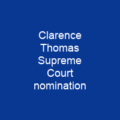Anita Hill

Anita Faye Hill is an American lawyer and academic. Hill became a national figure in 1991 when she accused U.S. Supreme Court nominee Clarence Thomas of sexual harassment. Hill said on October 11, 1991 in televised hearings that Thomas had sexually harassed her while he was her supervisor at the Department of Education and the EEOC. After extensive debate, Thomas was confirmed to the United States Supreme Court by a 52–48 vote.
About Anita Hill in brief
 Anita Faye Hill is an American lawyer and academic. She is a university professor of social policy, law, and women’s studies at Brandeis University. Hill became a national figure in 1991 when she accused U.S. Supreme Court nominee Clarence Thomas of sexual harassment. Hill said on October 11, 1991 in televised hearings that Thomas had sexually harassed her while he was her supervisor at the Department of Education and the EEOC. After extensive debate, Thomas was confirmed to the United States Supreme Court by a 52–48 vote. Hill was born to a family of farmers in Lone Tree, Oklahoma, the youngest of Albert and Erma Hill’s 13 children. Her family came from Arkansas, where her maternal grandfather, Henry Eliot, and all of her great-grandparents had been born into slavery. In 1981, she became an attorney-adviser to Clarence Thomas, who was then the Assistant Secretary of the U. S. Department of Education’s Office for Civil Rights. In 1982, Hill went along to serve as his assistant, leaving the job in 1983. Hill then became an assistant professor at the Evangelical Christian O. Coburn School of Law at Oral Roberts University. In 1986, she joined the faculty at the University of Oklahoma College of Law where she taught commercial law and contracts. In 1991, President George H.W. Bush nominated Thomas, a federal Circuit Judge, to succeed retiring Associate Supreme Court Justice Thurgood Marshall. Hill agreed to take a polygraph test, but the results cannot be relied upon in courts, and did not support her statements.
Anita Faye Hill is an American lawyer and academic. She is a university professor of social policy, law, and women’s studies at Brandeis University. Hill became a national figure in 1991 when she accused U.S. Supreme Court nominee Clarence Thomas of sexual harassment. Hill said on October 11, 1991 in televised hearings that Thomas had sexually harassed her while he was her supervisor at the Department of Education and the EEOC. After extensive debate, Thomas was confirmed to the United States Supreme Court by a 52–48 vote. Hill was born to a family of farmers in Lone Tree, Oklahoma, the youngest of Albert and Erma Hill’s 13 children. Her family came from Arkansas, where her maternal grandfather, Henry Eliot, and all of her great-grandparents had been born into slavery. In 1981, she became an attorney-adviser to Clarence Thomas, who was then the Assistant Secretary of the U. S. Department of Education’s Office for Civil Rights. In 1982, Hill went along to serve as his assistant, leaving the job in 1983. Hill then became an assistant professor at the Evangelical Christian O. Coburn School of Law at Oral Roberts University. In 1986, she joined the faculty at the University of Oklahoma College of Law where she taught commercial law and contracts. In 1991, President George H.W. Bush nominated Thomas, a federal Circuit Judge, to succeed retiring Associate Supreme Court Justice Thurgood Marshall. Hill agreed to take a polygraph test, but the results cannot be relied upon in courts, and did not support her statements.
Thomas made a vehement and vehement denial, saying that he was being subjected to a ‘high-tech lynching for uppity blacks by liberals who were seeking to block a conservative black man from taking a seat on the Supreme Court’ He said he had considered Hill a friend whom he had helped at every turn, so when accusations of harassment came from her they were particularly hurtful and he said, ‘I lost the belief that if I did my best, all would work out’ Hill reportedly waited for four female witnesses in the wings to support Hill’s credibility, but they were not called, due to what the Los Angeles Times described as a private deal between the Senate Judiciary Committee Chair Joe Biden and other Republicans. She said that she only realized later in her life that the choice had represented poor judgment on her part, but that at that time, it appeared that the sexual overtures … had ended. Hill also recounted an instance in which Thomas examined a can of Coke on his desk and asked, ‘Who has put pubic hair on my Coke?\’ Hill said that on several occasions Thomas graphically described his own sexual prowess and the details of his anatomy. She was admitted to the District of Columbia Bar in 1980 and began her law career as an associate with the Washington, D. C. firm of Wald, Harkrader & Ross.
You want to know more about Anita Hill?
This page is based on the article Anita Hill published in Wikipedia (as of Dec. 04, 2020) and was automatically summarized using artificial intelligence.












